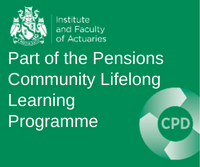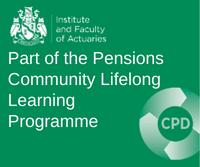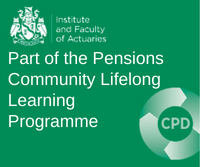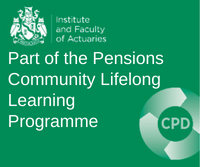Filter or search past events
-
Frank Redington is recognised as one of the most influential actuaries of all time. In this talk, Craig will review some of Redington's most important ideas. He will identify the consistent actuarial principles that form a common thread across the contributions Redington made to a broad range of actuarial fields, and will highlight the ongoing relevance of Redington's thinking to 21st century actuarial practice.
-
Pensions Winter Forum: Corporate Transactions
25 January 2022 Over recent months there has been a sharp rise in M&A activity involving British businesses, with interest from overseas, domestic buyers and Private Equity investors.
Over recent months there has been a sharp rise in M&A activity involving British businesses, with interest from overseas, domestic buyers and Private Equity investors. -
Pensions Winter Forum: How to win the pensions endgame
19 January 2022 With the Pension Schemes Act 2021 requiring a long term strategy from Trustees and sponsors, choosing a pensions endgame strategy has become even more critical. However, it is important that the endgame options available are adequately assessed before choosing one. With an ever-increasing array of creative and innovative options available, this decision may not be straightforward.
With the Pension Schemes Act 2021 requiring a long term strategy from Trustees and sponsors, choosing a pensions endgame strategy has become even more critical. However, it is important that the endgame options available are adequately assessed before choosing one. With an ever-increasing array of creative and innovative options available, this decision may not be straightforward. -
The dominant underwriting approach is a mix between rule-based engines and traditional underwriting. Applications are first assessed by automated rule-based engines which typically are capable of processing only simple applications. The remaining applications are reviewed by underwriters or referred to the reinsurers. This research aims to construct predictive machine learning models for complicated applications that cannot be processed by rule-based engines.
-
The Brian Hey Prize 2021 - LocalGLMnet: interpretable deep learning for tabular data
15 December 2021In this webinar, the authors of the 2021 Brian Hey prize winning paper presented a new deep learning model called the LocalGLMnet. While deep learning models lead to very competitive regression models, often outperforming classical statistical models such as generalized linear models, the disadvantage is that deep learning solutions are difficult to interpret and explain, and variable selection is not easily possible.
-
Sessional Meeting: Allowing for shocks in portfolio mortality models
15 December 2021The Covid-19 pandemic creates a challenge for actuaries analysing experience data that includes mortality shocks. To address this we present a methodology for modelling portfolio mortality data that offers local flexibility in the time dimension. The approach permits the identification of seasonal variation, mortality shocks, and late-reported deaths. The methodology also allows actuaries to measure portfolio-specific mortality improvements. Results are given for a mature annuity portfolio in the UK
-
Pensions Winter Forum: Pension Scams
8 December 2021 Pension scams have become more prevalent as a result of the pandemic, and Trustees have increased responsibilities to protect members, which means that actuaries need to be in a position to provide advice in this area. Our specialist panel will include a professional trustee, an IFA and head administrator, two of whom are members of PASA.
Pension scams have become more prevalent as a result of the pandemic, and Trustees have increased responsibilities to protect members, which means that actuaries need to be in a position to provide advice in this area. Our specialist panel will include a professional trustee, an IFA and head administrator, two of whom are members of PASA. -
The Growth Mindset for Actuaries
13 October 2021 - 8 December 2021This practical course is aimed at actuaries at any stage of their career who want to develop their own growth mindset and apply it to their work setting and personal or professional lifelong learning. The content of the course builds on the lecture given by Dr Helen Wright on Growth Mindset as part of the President’s 2021 Lecture series, and will be delivered over a period of 2 months, from mid-October to early December.
-
 Actuaries need to take action now - but how? With a focus on climate change, this session will provide informed insight to enable you to improve your knowledge and understanding of the issues involved, demonstrate how it will impact advice to your clients, and highlight prospective opportunities for actuaries within pensions and wider fields.
Actuaries need to take action now - but how? With a focus on climate change, this session will provide informed insight to enable you to improve your knowledge and understanding of the issues involved, demonstrate how it will impact advice to your clients, and highlight prospective opportunities for actuaries within pensions and wider fields. -
The Many Faces of Bias
2 December 2021 This webinar looks at the many types of biases, both conscious and unconscious and the impacts they can have in the workplace. Raising our own awareness and understanding of the issues can help us avoid the pitfalls of unconscious bias in particular. We’ve all heard the phrase ‘office banter’ but are we sure that’s how those on the receiving end perceive it and is it ok to go along with it?
This webinar looks at the many types of biases, both conscious and unconscious and the impacts they can have in the workplace. Raising our own awareness and understanding of the issues can help us avoid the pitfalls of unconscious bias in particular. We’ve all heard the phrase ‘office banter’ but are we sure that’s how those on the receiving end perceive it and is it ok to go along with it?

 Over recent months there has been a sharp rise in M&A activity involving British businesses, with interest from overseas, domestic buyers and Private Equity investors.
Over recent months there has been a sharp rise in M&A activity involving British businesses, with interest from overseas, domestic buyers and Private Equity investors.  With the Pension Schemes Act 2021 requiring a long term strategy from Trustees and sponsors, choosing a pensions endgame strategy has become even more critical. However, it is important that the endgame options available are adequately assessed before choosing one. With an ever-increasing array of creative and innovative options available, this decision may not be straightforward.
With the Pension Schemes Act 2021 requiring a long term strategy from Trustees and sponsors, choosing a pensions endgame strategy has become even more critical. However, it is important that the endgame options available are adequately assessed before choosing one. With an ever-increasing array of creative and innovative options available, this decision may not be straightforward. Pension scams have become more prevalent as a result of the pandemic, and Trustees have increased responsibilities to protect members, which means that actuaries need to be in a position to provide advice in this area. Our specialist panel will include a professional trustee, an IFA and head administrator, two of whom are members of PASA.
Pension scams have become more prevalent as a result of the pandemic, and Trustees have increased responsibilities to protect members, which means that actuaries need to be in a position to provide advice in this area. Our specialist panel will include a professional trustee, an IFA and head administrator, two of whom are members of PASA. Actuaries need to take action now - but how? With a focus on climate change, this session will provide informed insight to enable you to improve your knowledge and understanding of the issues involved, demonstrate how it will impact advice to your clients, and highlight prospective opportunities for actuaries within pensions and wider fields.
Actuaries need to take action now - but how? With a focus on climate change, this session will provide informed insight to enable you to improve your knowledge and understanding of the issues involved, demonstrate how it will impact advice to your clients, and highlight prospective opportunities for actuaries within pensions and wider fields. This webinar looks at the many types of biases, both conscious and unconscious and the impacts they can have in the workplace. Raising our own awareness and understanding of the issues can help us avoid the pitfalls of unconscious bias in particular. We’ve all heard the phrase ‘office banter’ but are we sure that’s how those on the receiving end perceive it and is it ok to go along with it?
This webinar looks at the many types of biases, both conscious and unconscious and the impacts they can have in the workplace. Raising our own awareness and understanding of the issues can help us avoid the pitfalls of unconscious bias in particular. We’ve all heard the phrase ‘office banter’ but are we sure that’s how those on the receiving end perceive it and is it ok to go along with it?